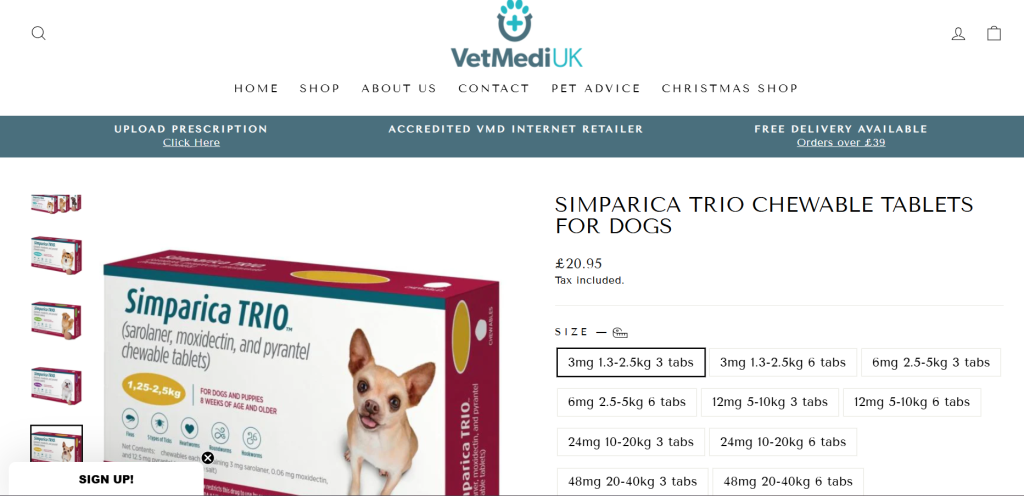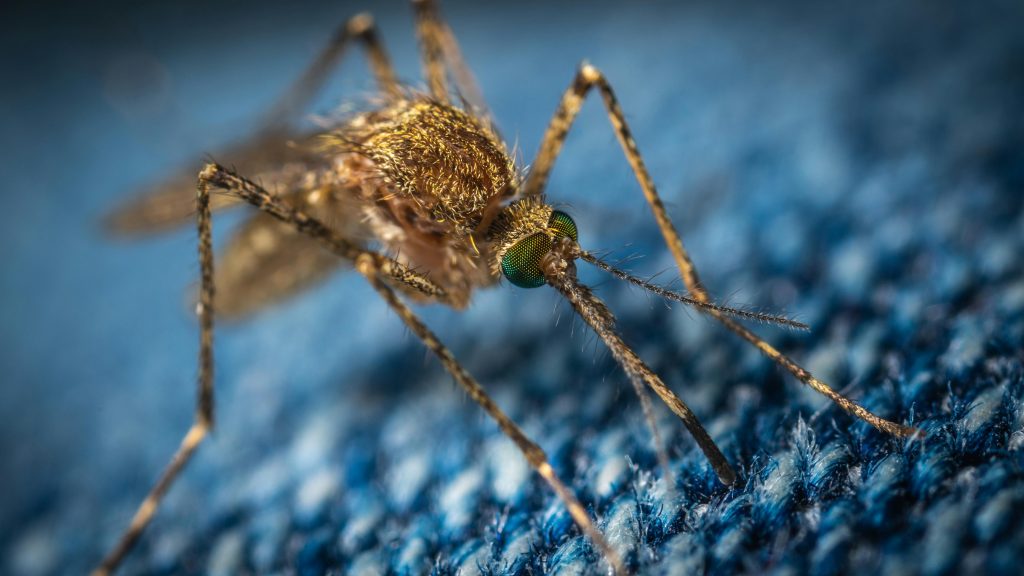Heartworm disease is a deadly illness that occurs in dogs universally. The cause of this disease are the parasitic worms named Dirofilaria immitis that are being transferred through mosquito bites. These parasites might get stuck in your dog’s heart, lungs, and associated blood vessels, which results in severe health issues.
However, heartworm disease is totally unnecessary if proper prevention is implemented. In this guide, we will talk about all the aspects related to heartworm prevention for dogs.
What Are Heartworms and How Do They Affect Dogs?
The worms that form the heartworms are parasitic and they live in the cardiovascular system of infected animals and reproduce there. They begin as larvae, introduced to the bloodstream by a mosquito, and develop over time into adult worms that can be as long as 12 inches.
Heartworms can be fatal for your dog if they aren’t treated with the damage that heartworms cause to your dog’s cardiovascular and pulmonary systems.

How Heartworm Disease Progresses
Heartworm disease develops in stages:
- Initial Infection: A mosquito which is a host of L3 stage heartworm larvae, bites your pet thus, introducing these nematodes directly into the dog’s bloodstream. Since this type of transmission happens without notice, the disease can be described as treacherous.
- Larvae Development: In a few weeks, these evolving larvae make the dog’s vascular system their highway eventually marching to the heart and lung arteries.
- Maturity: Six to seven months is the time it takes for the young nematodes to develop into adult worms capable of reproduction. Nevertheless, the amount of worms that one dog can have may reach up to 250.
- Severe Damage: The adult worms, due to their restriction, cause a slow blood flow to the heart, which in turn, may lead to an increase in blood pressure, a deteriorating heart, and low lung performance.
Symptoms of Heartworm Disease
In early days of heartworm disease, heartworm disease may not cause any symptoms; only when it gets worse, the first (mild) symptoms appear. Several other things need to be checked. The most common of them are these:
- Persistent when coughing
- Lack of willingness to exercise or physical performance
- Low, lack of food, anorexia
- Weight loss
- Breathing difficulty
- Large abdomen with edema accumulation
In untreated, thus worsened, cases heartworm disease results from a heart failure or organ damage, thus cruelly decreasing a dog’s lifespan. Though these symptoms are worrying, they come in correlation with other diseases, which makes annual testing a necessary obstruction to diagnosing heartworm disease.
How Is Heartworm Disease Transmitted?
The transmission of heartworm disease involves an infected mosquito, which carries microscopic larvae from one animal to another. Dogs bitten by infected mosquitoes are at risk, especially in regions where mosquitoes thrive year-round.
Understanding the Lifecycle of Heartworms
The lifecycle of a heartworm begins when a mosquito bites an infected animal and ingests microfilariae (immature larvae). These larvae develop within the mosquito for about 10–14 days before being transmitted to another host through a bite. Once inside the new host, the larvae migrate and mature, completing the lifecycle.
Is Your Dog at Risk?

Specific factors that lead to heartworm infection:
- Geographical Location: Heartworms are mostly found in warm and humid areas like the Southern United States. Nevertheless, from California to New York, mosquito origin, all states have reported the disease.
- Outdoor Exposure: Dogs that stay outside for a longer time are more likely to be bitten by mosquitoes, however, indoor dogs are also not very safe.
- Seasonal Variation: Mosquito counts climb during the summer but they may be around all year in warmer climates. That was the fact, even in a cold region it is crucial to prevent heartworm as mosquitoes can be kept indoors.
Also Read: Hill’s Science Diet Dog Food: Nutrition That Matters
Can Heartworms Affect Other Animals?
Heartworm disease is a condition affecting not only dogs. Even though both cats and ferrets are less likely to be infected, they could still get heartworm infections. Cats, for one, can have issues such as a lack of air and vomiting, while ferrets, on the other hand, might show signs of weariness or difficulty in breathing.
Knowing that mosquitoes can transmit the disease to other species as well makes you realize how crucial it is to control mosquito populations in the locations around you.
The Importance of Heartworm Prevention for dogs
Heartworms are the only parasites in dogs that could not be eliminated with over-the-counter medications once they establish themselves. Besides, preventing is not only the easier way but it is safer and even costs less as well. Prophylactic actions include frequent medication, testing, and behavioral changes that reduce mosquito exposure.
Why Is Prevention Critical?
Heartworm prevention for dogs doesn’t only keeps your dog away from getting painful and expensive treatments but also is very effective and safe for your pet. The clearing of the parasites will be preferably a lengthy process which may involve the use of toxic medications and obligatory exercise restrictions to avoid complications when the disease is already established.
Preventing these problems will not only keep your dog healthy but also ensure he never has to go through these risks.
Preventative Medications

Heartworm disease prevention is highly effective and can be of different types as follows:
- Monthly Oral Tablets: These are chewable tablets meant to kill the larvae that are in your dog’s bloodstream before they fully develop and become adults. They are a terrific option for dogs that voluntarily ingest treats.
- Topical Treatments: The topicals that are put on the skin of the dog are a kind of refrain from mosquito bites to mosquitoes while at the same time killing the larvae. The product should be applied properly to make it as effective as possible.
- Injectable Preventatives: Long-lasting injections offer up to 12 months of protection. Therefore, there is no need for monthly administration. These are suited for owners who may sometimes forget to give their dogs the medications regularly.
It’s essential to administer preventatives as directed by your veterinarian. Even the omission of preventive treatment for a few days could expose your dog to the infection.
Yearly Testing: A Necessary Measure in Heartworm Control
Annual testing makes sure that your dog is still free of the disease and that the treatments you are using are effective. Although your pet is getting a pill, testing is necessary because no method of prevention is 100% foolproof. Some pharmaceuticals can be inefficient because of bad administration or parasites’ resistance.
How Does Testing Work?
Typically the procedure comprises a blood test to determine the presence of the heartworm proteins. At times, ancillary imaging or diagnostics might also be done.
- Antigen Test: The proteins are indicated by the female heartworms that are already in the body.
- Microfilaria Test: It verifies if microscopic larvae are present in the blood or not.
- Radiographs and Therapeutic Ultrasounds: Also, imaging in more extreme cases may help determine how much damage has been done to bones by adult worms.
To confirm a dog is healthy and has no infection, get an annual test even if it is on preventative medication for the whole year.
Reducing Mosquito Exposure
Heartwormed dogs are highly endangered mainly because mosquitoes transmit the disease, and thus you can save your dog by avoiding his or her exposure.
Practical Steps to Keep Mosquitoes Away

- Remove Standing Water: Inspect and get rid of standing water in flowerpots, gutters, and outdoor areas. This is where mosquitoes breed.
- Install Screens: Verify that your home’s windows and doors are outfitted with screens to keep mosquitoes out.
- Use Mosquito Repellents for Pets: Look for veterinarian-approved repellents particularly made for dogs. Never use human mosquito repellents, as some ingredients can be toxic to pets.
- Keep Grass Trimmed: Long grasses are good hiding places for mosquitoes. Regularly lawn maintenance is the key to fights against mosquitoes.
Besides dogs, reducing the mosquito infliction also covers other pet animals and family members’ safety.
What to Do if Your Dog Tests Positive for Heartworms?
Although a heartworm test that is positive can be upsetting, there are methods of treatment that are effective. Your vet will probably recommend a series of steps:
- Confirmatory Testing: Other tests of the presence and the severity of infection will confirm that treatment is needed rather than cleaning of the infection. If the tests are not clean, it means your wounds are infected.
- Treatment Plan: The doctor may use antiparasitic injections or medications to bring the adult worms and larvae to a complete stop.
- Exercise Restriction: During this period, activity will be limited to prevent blood clotting.
- Follow-Up Care: Regular visits ensure proper treatment and management of complications.
As the disease requires both emotional and financial inputs in the treatment process, it may not be an easy one. Small wonder then that treatment is recommended only as a last option. The policy of defensive medicine is the best for not getting to such a course in.
Are There Natural Alternatives to Prevent Heartworm?
Some pet owners have turned to natural remedies, with the aim of them, serving the purpose of protecting their pets. Along with decreasing the mosquito bites you can also use some alternative natural approaches, like essential oils or herbal collars but they should always accompany the medications recommended by the vet.
Natural treatments can add an extra layer of defense, but they do not cover the same level of efficacy as prescribed precursors. Make your vet know such possibilities and consequently, keeping your pooch safe from any harm or illness will not be difficult.
Heartworm Prevention for Puppies and Senior Dogs
On the one hand, prevention of heartworm disease in puppies and senior dogs needs due caution.
Puppies
- Prevention should be started at 6-8 weeks of age in a puppy.
- Make sure that the puppy has been tested for heartworms first, before starting to use medications.
Senior Dogs
- Routine testing is mandatory because sometimes the older dogs have weak immune systems.
- This should be accomplished by adapting the preventive medication to the dog’s health problems along age lines.
- Closely observing for side effects is important, as older dogs may have diseases that contribute to the interaction with medicine.
Also Read: Purina Pro Plan Sensitive Skin and Stomach: Guide
What is the safest heartworm prevention for dogs?
The best safe heartworm prevention is vet-prescribed medications, which include chewy pills, topical treatments, or long-lasting injections that are given out on a monthly basis and are specifically designed for your dog.
What is the protocol for heartworm treatment in dogs?
Heartworm treatment consists of confirmatory tests, the administration of anti-parasitic drugs, restriction of exercise, and follow-up care under the supervision of a veterinarian.
How do I prevent heartworm in my dog?
Prevent heartworm with vet-approved medications, annual testing, and minimizing mosquito exposure.
Is there a natural heartworm prevention?
Natural methods like essential oils and mosquito control can help reduce heartworm risk but shouldn’t replace vet-approved medications.










